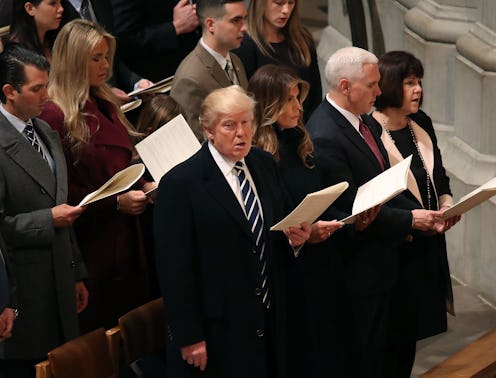News
Will The Religious Freedom Executive Order Go To Court?

President Trump gave his religious supporters — of whom there are many — the perfect gift for the National Day of Prayer: an executive order designed to "protect and vigorously promote religious liberty." While that doesn't inherently sound bad, it is worded to let religiously affiliated employers deny contraception coverage to employees and to allow for greater leeway to tax-exempt groups to engage in political activity like endorsing political candidates. But while this is a big win for his religious supporters, others are not so happy. Will the religious freedom executive order go to court? There's no doubt that it will.
Even before Trump signed the order, groups like the American Civil Liberties Union and the Human Rights Campaign promised to fight it. USA Today reported that the main concerns are the denial of contraceptive coverage and the ability for religious groups to legally discriminate against LGBTQ Americans and perhaps even religious minorities. They have been worried since an earlier draft leaked in February. Sarah Warbelow, legal director for HRC, explained to the paper why the group would fight it:
It would create an unprecedented license to discriminate with taxpayers’ funds, undermine women’s health care and elevate one narrow set of religious beliefs over all others.
The ACLU has a record of taking the Trump administration to court, and this instance is no different. "If President Trump signs an executive order that attempts to provide a license to discriminate against women or LGBT people, we will see him in court," ACLU Deputy Legal Director Louise Melling said in a statement.
What's perhaps most interesting about the potential legal challengers are the campaign finance groups that are also calling out the order. The order would specifically direct the IRS to all but ignore the Johnson Amendment, which is a 1954 law that prohibits tax-exempt groups including churches from "directly or indirectly participating in, or intervening in, any political campaign on behalf of (or in opposition to) any candidate for elective public office."
One such group, Democracy 21, explained why. The group's president, Fred Wertheimer, told USA Today, "President Trump seems to believe the law is whatever he says it is." His main point was that the administration seems to be planning on just ignoring laws instead of repealing them. "He attacks judges and the courts for interpreting the law differently than what he pronounces the laws to be and now he appears to be trying to nullify laws by not having them enforced," Wertheimer said.
The religious conservatives, chief among them Mike Pence, will take this as a win. But ultimately, it may not be.